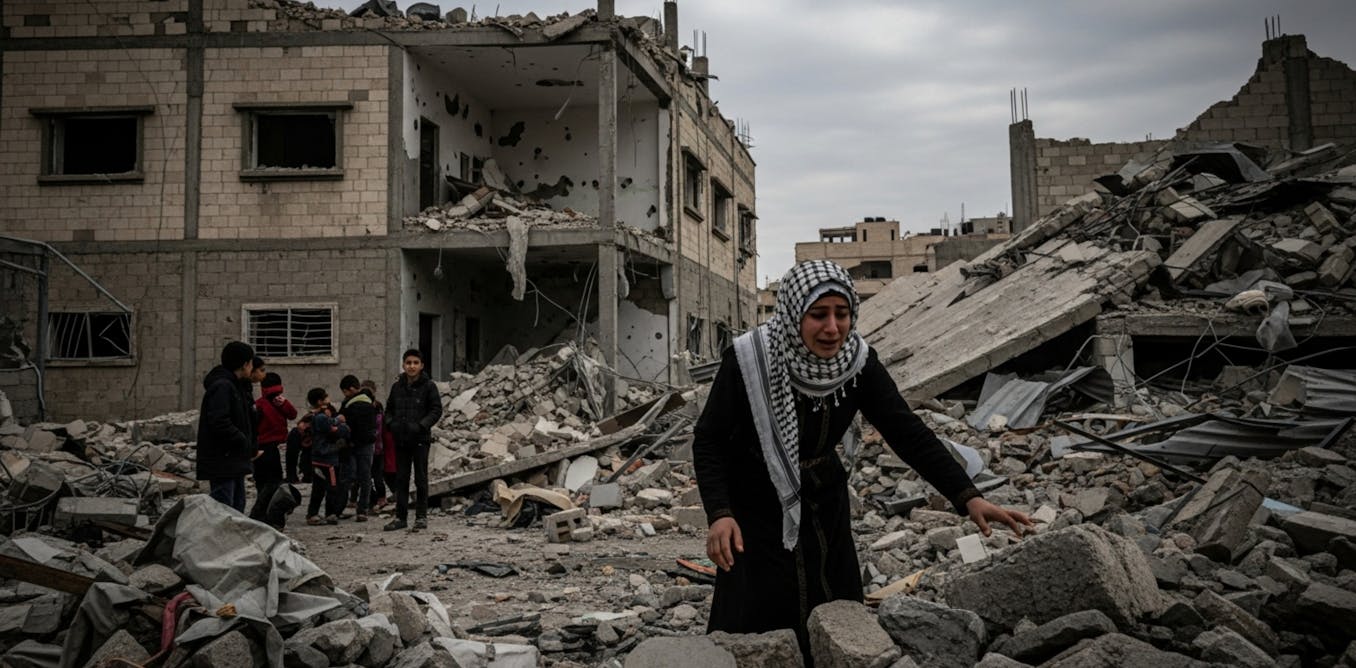“When a wise man points at the moon, the imbecile examines the finger.”
This proverb – attributed to Conficius – pinpoints the human tendency to focus on a message, messenger or concept instead of the reality that it signals, especially when that reality might be uncomfortable or upsetting. Today, it is acutely relevant to the ongoing killing and starvation in Gaza.
Many scholars, lawyers, journalists and officials have defined the Government of Israel’s actions in Palestine as genocide, war crimes, or crimes against humanity. The Government of Israel and its allies refute these claims, but often do so on the grounds of antisemitism or ulterior motive rather than any objective truth about events themselves. At the same time, many activists use these concepts without a comprehensive understanding of their theoretical implications.
Genocide is distinct from other crimes. It is not a word to be used lightly, or a way of describing an ordinary crime on a larger scale. Genocide requires a political and ideological foundation that enables the justification – at both institutional and collective levels – of the extermination of a people and their culture, and casts it as a legitimate or even desirable course of action.
To think in terms of genocide, we therefore have to look beyond the individual, and analyse episodes of mass violence as political, historical and anthropological events.
Read more:
Why have so few atrocities ever been recognised as genocide?
Conceptualising genocide
Though genocides have occurred throughout human history, the term itself is a neologism, coined by the Polish lawyer Raphael Lemkin in the early 1940s. He did this by reconstructing various historical events that had brought about the destruction of cultures.
Building on the work of Polish anthropologist Bronisław Malinowski, he found examples of such destruction in European colonial expansion around the globe, and acts such as the mass killing of Armenians in Anatolia during World War I. After evaluating these events, he concluded that there were no effective legal or political instruments to protect cultural groups from an imminent threat of destruction. This led him to fight for the international recognition of just such a protective framework.
Lemkin himself experienced the absence of safeguards when he was forced to flee Nazi persecution, leaving behind many family members who would be killed for their Jewish identity during World War II. While in exile in the United States after the end of the war, he succeeded in persuading the newly established United Nations (UN) to adopt his new concept.
In Resolution 96 of the UN General Assembly of 11 December 1946, we can clearly see Lemkin’s influence, and the presence of historical and anthropological elements in the definition of genocide. The Resolution, entitled The Crime of Genocide, reads as follows:
“Genocide is a denial of the right of existence of entire human groups, as homicide is the denial of the right to live of individual human beings; such denial of the right of existence shocks the conscience of mankind, results in great losses to humanity in the form of cultural and other contributions represented by these human groups, and is contrary to moral law and to the spirit and aims of the United Nations. Many instances of such crimes of genocide have occurred when racial, religious, political and other groups have been destroyed, entirely or in part.”
Read more:
Genocide’s legal limitations: what the Srebrenica massacre can teach us about Gaza
Collective crime, collective victims
From this moment on, attempts began to make the concept fit within legal and political frameworks. But genocide is not a clearly defined legal or political standard. Rather, it is a way of understanding a unique kind of violent process, and debates on how to define it continue to this day.
Influential thinkers such as Philippe Sands – especially his seminal 2016 work East West Street: On the Origins of Genocide and Crimes Against Humanity – have reinforced a common belief in the legal superiority of the concept of crimes against humanity. This is largely because Sands follows Hersch Lauterpacht’s argument, which emphasises the primacy of the individual. However, genocide is an inherently collective crime – both in terms of its perpetrators and its victims.
According to some readings of Sands’ argument, the individual takes precedence because they fit into our established notions and structures of criminal justice, which are built to identify and prosecute individual perpetrators of specific crimes. When it comes to genocide, however, applying this framework has always been less about legal rigour, and more the result of political weakness. Put simply, it is easier to prosecute a handful of ringleaders than an entire government or military.
Even this individualised model falls short. Despite widespread calls to recognise the Israeli government’s actions as genocide – including from Israel-based human rights groups – recent months have seen countries such as Hungary and the US flaunt ICC arrest warrants for Israeli officials. Israel’s allies in the US, UK and EU have also refused to take political action by applying sanctions, and continue to supply Israel with weapons.
This shows that genocide is a fundamentally political crime. There can be no prosecution under international law without political enforcement, whether this takes the form of diplomatic pressure or more direct military action against the aggressor.
Read more:
Gaza is starving – how Israel’s allies can go beyond words and take meaningful action
Genocide in Palestine
When we talk about genocide, we must be specific. The key question is not to determine whether the conditions have been met to judge specific perpetrators of specific acts of violence as genocidal, but rather to understand the logic behind the practices. A conviction for genocide or crimes against humanity does not save lives, but the very consideration that genocide is being committed or has been committed carries profound political implications.
Nevertheless, what we are witnessing in Gaza demonstrates the strength of this concept, not its weakness. As academics, we debate whether the type of mass violence used by Israel constitutes genocide, but so does the outraged public as it protests in the streets worldwide. The same even goes for the Israeli government and its supporters – they cannot avoid thinking about genocide, even if only to deny it.
Defining Israel’s violence in Palestine as genocidal will not stop the killings, but neither would any other legal classification. Accepting such an interpretation only serves to shift the focus away from the party that is ultimately responsible: politics.
Regardless of any doubts or limitations, thinking and talking about genocide remains a potent tool for keeping our eyes on the moon, and not on the finger pointing at it.



